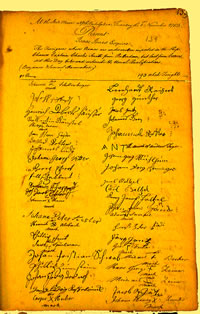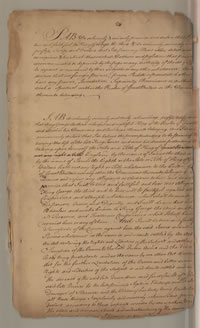Oaths of Fidelity and Abjuration, ca.1760, and List of Oath-takers - November 1, 1763
Images
Click images for larger versions.
History
Record Group 26: Records of the Department of State, Ships' Lists of German Passengers, Oaths of Fidelity and Abjuration, iron gall ink on paper, 16"X10" and list of signatures of oath-takers, November 1, 1763 (List 239-C), p. 139 in volume F; iron gall ink.
Approximately seventy percent of German-speaking immigrants to Great Britain's American colonies came to Pennsylvania. A few may have arrived from lands that are now Germany and Switzerland before William Penn received a charter to his colony in 1681. In 1683, the first group of significant size began to settle in the village of Germantown, near where the Wissahickon Creek flows into the Schuylkill River. German-speaking immigrants who arrived later moved into the interior to such an extent that they dominated numerically the colonial counties of Northampton, Berks, Lancaster, and York. Approximately 15,000 entered the province prior to 1727. Between 1727 and 1775, more than 70,000 arrived. German immigrants continued to be numerous until the late 1800s. According to a recent census, about 49,000,000 Americans, or 22% of the population, claimed German ancestry, the same as the percentage of English origin and higher than the proportion of Americans of other ethnic backgrounds. The same census disclosed that 34% of Pennsylvania's population were of German background.
The large influx of German speaking colonists alarmed provincial officials. In 1727, Governor Patrick Gordon warned the legislature that the "large numbers of Strangers" entering "daily" could endanger Pennsylvania's "peace and security." The Governor and the council then required all foreign males age sixteen and over to take an oath of allegiance to the King of Great Britain, a requirement that remained in force until the end of the colonial period in 1776.
The Oaths of Fidelity and Abjuration to King George III (1760-1820) and the Pope reveal the political and religious tensions that were prominent in England at the time. England's most powerful enemies were the Catholic nations of France and Spain. In 1570, Pope Pius V excommunicated England's Queen Elizabeth I (1558-1604) and claimed to relieve her subjects from obedience. Most of the English people, however, remained loyal to their Queen. Two years later, the Pope commissioned Spain's King Philip II (1556 - 1598) to remove Queen Elizabeth I from the throne. In 1588, Philip sent the famous Armada in a futile attempt to carry out this commission. Relations with France also were tense during this period. Settlers on the frontiers of England's North American colonies accused French Catholic missionaries of encouraging Indians to attack them. During the 1750s, France and England fought a war to determine mastery of the eastern half of North America. Increasingly Protestant England became intolerant of Catholicism.
Even many years after the Glorious Revolution of 1688 that resulted in the exile of England's Catholic King James II (1685-1688), the oath emphasized the Protestant succession to the throne. Oath-takers promised to be loyal to the heirs of the "late princess Sophia, Electress and Duchess Dowager of Hanover and heirs of her body being Protestant." Because Queen Anne (1702-1714), the Protestant daughter of King James II, died childless, and because the Catholic son of James was considered unacceptable, the English parliament passed the succession to the Protestant House of Hanover, a large principality in present-day Germany. The Hanoverian rulers were descended from Elizabeth, daughter of King James I (1604-1625). They were known as electors because they participated in the selection of the Holy Roman emperor. Sophia was the wife of Elector Ernest Augustus and was designated as the successor to Queen Anne. Since she was 84 when Queen Anne died in 1717, her son ascended the throne, as King George I. George III was his great-grandson.
Despite the British parliament's legislation on the royal succession, supporters of King James II claimed that his son, whom they called James III, and whom some Scots called James VIII (King James I of England had been James II of Scotland before becoming the monarch of the United Kingdom), was the rightful heir to the throne. Proponents of the "Glorious Revolution" of 1688 that resulted in King James's removal called his son the "pretender." Members of a faction in British politics continued to press the "pretender's" claims well into the 1700s. As the German-speaking oath takers pledged their loyalty to King George III, they promised also to disclose "all Treasons and Traitorous Conspiracies," presumably concerning placing the son of King James II on the throne.
The Commonwealth required an Oath of Allegiance to be administered to the non-British immigrants beginning in 1727. The Oaths of Fidelity and Abjuration were begun in 1729; the first specifically required the oath-taker to disavow any ties to other monarchs and embrace the British ruler; and the second to abjure, or renounce, any previous connection to the Pope. The November 1, 1763 list of ninety-seven oath-takers from the Ship Chance is a typical example. The ship, captained by Charles Smith from Rotterdam, landed at Philadelphia, and the oaths were administered at the State House, now known as Independence Hall. Males were required to take the oath, usually as the heads of families. This list shows 97 persons taking the oath, and 193 "whole freights", presumably women and children. Though ship captains were required to also include the place of origin for each passenger, this was rarely done. The list of "Strangers" who took the oaths contain their actual signatures, or their marks, if they could not write. Their names are typically of Germanic origin. They are in the script that literate Germans used in the eighteenth and nineteenth centuries. Although the English-speaking immigration officials sometimes cast aspersions on the "strangers'" intelligence, the signatures demonstrate that the vast majority could write in their own language. Nevertheless, a few of the immigrants signed by making their marks in the form of an "X" or other symbol.
Transcript
Published in Strassburger and Hinke, Pennsylvania German Pioneers: A Publication of the Original Lists of Arrivals in the Port of Philadelphia from 1727-1808, Norristown, PA German Society, 1934.
"I A B do solemnly & sincerely promise & declare that I will be true & faithful to King George the Second and do solemnly sincerely and truly Profess Testifie & Declare that I do from my Heart abhor, detest & renounce as impious & heretical that wicked Doctrine & Position that Princes Excommunicated or deprived by the Pope or any Authority of the See of Rome may be deposed or murthered by their Subjects or any other whatsoever. And I do declare that no Forreign Prince Person Prelate State or Potentate hath or ought to have any Power Jurisdiction Superiority Preeminence or Authority Ecclesiastical or Spiritual within the Realm of Great Britain or the Dominions thereunto belonging.
"I A B do solemnly sincerely and truly acknowledge profess testify & declare that King George the Second is lawful & rightful King of the Realm of Great Britain & of all others his Dominions & Countries thereunto belonging, And I do solemnly & sincerely declare that I do believe the Person pretending to be Prince of Wales during the Life of the late King James, and since his Decease pretending to be & taking upon himself the Stile & Title of King of England by the Name of James the third, or of Scotland by the Name of James the Eighth or the Stile & Title of King of Great Britain hath not any Right or Title whatsoever to the Crown of the Realm of Great Britain, nor any other the Dominions thereunto belonging. And I do renounce & refuse any Allegiance or obedience to him & do solemnly promise that I will be true and faithful, & bear true allegiance to King George the Second & to him will be faithful against all traitorous Conspiracies & attempts whatsoever which shall be made against his Person Crown & Dignity & I will do my best Endeavours to disclose & make known to King George the Second & his Successors all Treasons and traitorous Conspiracies which I shall Know to be made against him or any of them. And I will be true & faithful to the Succession of the Crown against him the said James & all other Persons whatsoever as the same is & stands settled by An Act Entituled An Act declaring the Rights & Liberties of the Subject & settling the Succession of the Crown to the late Queen Anne & the Heirs of her Body being Protestants, and as the same by one other Act Entituled An Act for the further Limitation of the Crown & better securing the Rights & Liberties of the subject is & stands settled & entailed after the Decease of the said late Queen, & for Default of Issue of the said late Queen, to the late Princess Sophia Electoress & Dutchess Dowager of Hannover & the Heirs of her Body being Protestants; and all these things I do plainly & sincerely acknowledge promise & declare according to these express Words by me spoken & according to the plain & common Sense and understanding of the same Words, without any Equivocation mental Evasion or secret Reservation whatsoever. And I do make this Recognition Acknowledgement Renunciation & Promise heartily willingly & truly."
[List 239 C] At the State House at Philadelphia, Tuesday, the 1st November, 1763.
Present: Isaac Jones, Esquire.
The Foreigners whose Names are underwritten, imported in the Ship Chance, Captain Charles Smith, from Rotterdam, but last from Cowes, did this Day take and subscribe the Usual Qualifications. 193 whole Freights. 97 Persons. (Benjamin & Samuel Shoemaker.)
Johannes (X) Schellenberger
Joseph Seyferdt
Henrich Debertshäuser
Vallentin Gänsel
Philip (X) Casner
Jean Henri Gaydon
David Golter
Johannes Ludy
Johann Georg Vetter
Georg Ebert
Filb Schabbert
Nicolaus Schapperdt
Joh. Jacob Schnorss
Johannes (X) Shnors
Johann Peter Kesler
Henrich (X) Alsbach
Phillip Schmit
Jacob (+) Spielman
Johann Christian Schwab
Philip Zumstain
Johann Jerg Dornech
Georg Ludwig Kesselrinck
Casper (X) Huber
Bernhardt Raichert
Georg Günther
Jacob Jantz
Johannes Gern
Johannes Rotter
Andrew (ANT) Teyer
Johann Georg Mühlheim
Johann Gorg Henninger
Jacob Baltzel
Carl Baltzel
Georg Jacob Baltzel
Johan Petter Hauck
Adam (X) Sampel
Hans Peter Studi
Görg Gantz
Geo. (F) Fisher
Michael (X) Becker
Hans George (X) Zeiner
Michael (X) Zeiner
Jacob Schädt
Johann Henry (X) Shuntz
Johannes Dorst
Jacob Schlick
Johann Michael Altz
Jacob Behr
Jacob Ebersoll
Peterus Wolf
Christian Mangolt
Frietrig Arnolt
Johann Jacob Sonntag
Johann Jakob [?] Hoffman
Johann Valatin Hauck
Peter Krafft
Georg Heinrich Planckenhorn
Johannes Doerbaum
Friedrich Wilhelm Stahl
Johann Benedictus Grieben
Adam Schmid
Michel Schmidt
Daniel Zutter
Balthaser Zutter
Henry (H) Schwarts
Johannes Weller
Johann Wendell Fackler
Johannes Engelberth
Jnº Henry (X) Miller
Anthon Hausam
Martin Braun
Samuel Müller
Jacob Bernhart
Johann Thomas Gil
Johannes Jacob Jud
Johannes Peter Münner
Johannes Engel Örder
Johann Eckart Oerter
Michel Stoffel
Jost Henrich Schmidt
Johann Henrich Keil
Johannes Peter Becker
Henrich Menges
Johann Ernst Thiel
Samuel Cyriaci
Balthasar Christ
Valentin Nicodemus
Johannes Krätzer
Michael (+) Speilman
Emanuel (X) Miesterrer
Nicolaus Wistadius
Philipp Georg Kneicht

